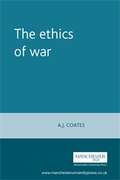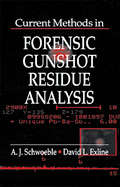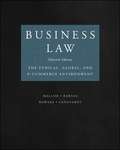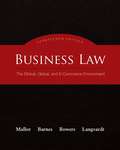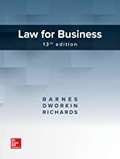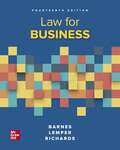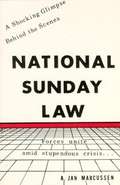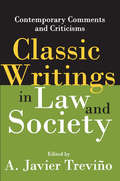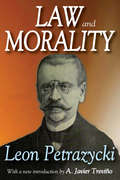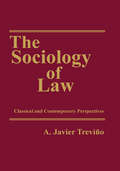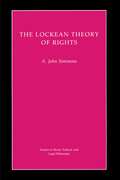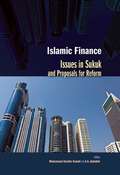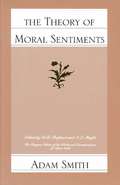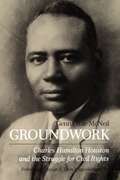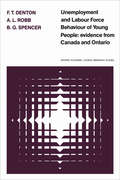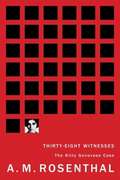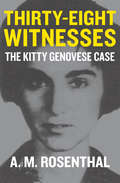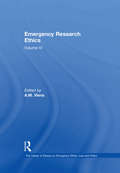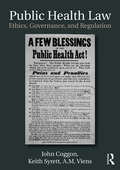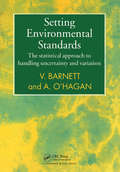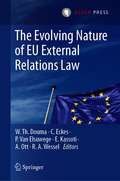- Table View
- List View
The Ethics of War
by A. J. CoatesDrawing on examples from the history of warfare from the crusades to the present day, "The ethics of war" explores the limits and possibilities of the moral regulation of war. While resisting the commonly held view that 'war is hell', A. J. Coates focuses on the tensions which exist between war and morality. The argument is conducted from a just war standpoint, though the moral ambiguity and mixed record of that tradition is acknowledge and the dangers which an exaggerated view of the justice or moral worth of war poses are underlined.
Beyond This Place
by A. J. CroninThis is the story of a son and his father, a crime of passion and a crime of injustice.
Current Methods in Forensic Gunshot Residue Analysis
by A. J. Schwoeble David L. ExlineWith the improvements in collection methods and analytical tools that allow more thorough analyses, gunshot residue examination has made a dramatic impact as an area of trace evidence essential to the investigation and prosecution of violent crime. Current Methods in Forensic Gunshot Residue Analysis deals with major areas of gunshot residue analysis, including current and future methods of analysis, collection techniques, interpretation of evidence, expert testimony and report writing. This text is a necessity for forensic scientists conducting this type of analysis and anyone involved in the investigation and prosecution of violent crimes involving firearms.
Business Law: The Ethical, Global, and E-Commerce Environment (Fifteenth Edition)
by A. James Barnes L. Thomas Bowers Jane Mallor Arlen LangvardtMallor, Barnes, Bowers and Langvardt’s: Business Law, 15e is appropriate for the two-term business law course. The cases in the 15th edition are excerpted and edited by the authors. The syntax is not altered, therefore retains the language of the courts. As in recent previous editions, the 15th edition includes a mix of actual AND hypothetical cases. This text is our most research-based Business Law text.
Business Law: The Ethical, Global, and E-Commerce Environment (Fourteenth Edition)
by Jane P. Mallor A. James Barnes L. Thomas Bowers Arlen W. Langvardt Jane Mallor Arlen LangvardtMallor, Barnes, Bowers and Langvardt's: Business Law: The Ethical, Global, and E-Commerce Environment, 14e is appropriate for the two-term business law course. The cases in the 14th edition are excerpted and edited by the authors. The syntax is not altered, therefore retaining the language of the courts. As in recent previous editions, the 14th edition includes a mix of actual AND hypothetical cases.
Law for Business
by Eric L. Richards A. James Barnes Terry Morehead DworkinBusiness Law 10/e has provided students with a comprehensive, yet concise treatment of the legal issues of fundamental importance to business students and the business profession. The cases, which have always been a strong feature, are edited and re-written by the authors, who divide the material into three categories: facts, issues, decisions. The authors, Barnes, Dworkin, and Richards, choose cases that are appropriate to explain precedent and history as well as include “hot topic” cases that relate to current events. In addition to case applications, the authors use such techniques as content summaries to apply concepts to practice. Effective managers and employees must develop knowledge of both law and business because people involved in business also are involved in, and greatly affected by, the laws concerning business.
Law for Business
by Eric L. Richards A. James Barnes Timothy A. LemperA focus on readability and proven pedagogical devices ensures Law for Business is a student-friendly perspective that will aid students in their comprehension and critical analysis of often complex topics in business law. It’s comprehensive, yet concise approach is appealing to both students and instructors alike giving instructors flexibility and students the ability to understand the fundamental importance of how legal issues impact decision making in business.
National Sunday Law
by A. Jan MarcussenNational Sunday Law explains exactly who the beast is, what the image of the beast is, and what the mark of the beast is. <P><P>A fascinating book and a must for anyone in search of the truth. National Sunday Law is a small paperback book with less than 100 pages and medium size print, a very quick read. <P><P>National Sunday Law was first published in 1983 and is now in its 110th printing with 36.8 million in print.
Classic Writings in Law and Society: Contemporary Comments and Criticisms
by A. Javier TrevinoOver against such reference volumes as encyclopedias, which are intended to provide an overview and summary of a subject, and dictionaries, which define a series of terms, "commentaries" generally consist of a collection of lectures or essays that discuss and explain in some detail particular topics and sources. In law, the best known and oldest of these is William Blackstone's Commentaries on the Laws of England (1765-1769). Others, which are equally prominent, include James Kent's Commentaries on American Law (1826) and Joseph Story's Commentaries on the Constitution of the United States (1833). This volume is presented in the spirit of the aforementioned treatises. It consists of several essays of contemporary comments and criticisms intended generally to inform and educate.The commentaries in this book have two collective purposes. First and foremost, they are intended to acquaint a new generation of students with thirteen classic books written by diverse sociolegal scholars--ranging from Henry Sumner Maine, Oliver Wendell Holmes, Jr., and Hans Kelsen to Eugen Ehrlich, Nicholas S. Timasheff, and Richard Quinney. Second, they endeavor to demonstrate the contemporary theoretical relevance, the continuing legacy, of these classic writings. Accordingly, the commentaries discuss each of the scholars' work in general, how the particular book under consideration fits into that corpus, and how the book is assessed in a contemporary context. Singly and collectively these books have a clear relation to the "classic" tradition in thought--a tradition that, although not always acknowledged, is of great significance to current theorizing in law and society.The classic tradition represents those books that have come to be considered the foundational texts in the social scientific study of law. The commentaries collected here were written by some of today's leading scholars of law and society, including Piers Beirne, Dario Melossi, Kalus A. Zigert, Alan Hunt, Marshall B. Clinard, and Dragan Milovanovic.
Law and Morality: Leon Petrazycki (Twentieth Century Legal Philosophy Ser. #7)
by A. Javier Trevino Leon PetrazyckiIn analyzing the socio-psychic nature and operations of intuitive legal rules, Petrazycki formulates a theory of law around five conceptual themes: anti-formalism, imperative-attributive legal relationships, law's functional control, law's subjective reality and morality. Petrazycki presents the two ways by which law coordinates and regulates social conduct as through its distributive and organizing functions. Law and Morality has a basic objective: to analyze interrelations between positive and intuitive law. Petrazycki's socio-psychic orientation toward law is behavioral as well as thoughtful. He finds the most suitable methods for obtaining knowledge about legal experiences to be internal and external observation. His technique of introspection is similar to Max Weber's conceptual method. Petrazycki distinguishes between two kinds of interpretive understanding. External observation involves deriving the meaning of an act or symbolic expression from immediate observation without reference to any broader context, and internal observation involves placing the particular act in a broader context of meaning involving facts that cannot be derived from a particular act or expression. Petrazycki's socio-legal ideas remain relevant in today's society. His arguments concerning the global expansion of human love have an attraction for those working towards a better world. In the context of positive psychology and the growing happiness industry, Petrazycki's ideas will compel legal scholars to consider his arguments. Petrazycki's work stands out for the scientific ambitions and systematic nature of his thought as well as the influence of his work on later scholars in the sociology of law.
The Sociology of Law: Classical and Contemporary Perspectives
by A. Javier TrevinoThe purpose of this book is to introduce the sociology of law by providing a coherent organization to the general body of literature in that field. As such, the text gives a comprehensive overview of theoretical sociology of law. It deals with the broad expanse of the field and covers a vast amount of intellectual terrain. This volume is intended to fill a gap in the literature. Most textbooks in the sociology of law are insufficiently theoretical or else do not provide a paradigmatic analysis of sociological theories.The content of this text consists of discussions of the works of scholars who have contributed the most to the cumulative development of the sociology of law. It surveys the major traditions of legal sociology but is not wedded to any one particular theoretical approach. Both the "classical," or nineteenth-century, and "contemporary," or twentieth-century, perspectives are covered. The reader will see that nineteenth-century thought has directly influenced the emergence of twentieth-century theory.One unique feature of this book is that key sociological and legal concepts, presented in bold print and italics, are defined, described, and illustrated throughout. Although the nature of the subject matter is highly theoretical and, at times, quite complex, Trevino values every effort to present the material in the most straightforward and intelligible form possible without compromising the integrity of the theories themselves. In short, this book aims to accomplish three objectives: inform about the progressive advancement of sociological theory, teach the reader to analyze the law as a social phenomenon, and develop in the reader a critical mode of thinking about issues relevant to the relationship between law and society.
The Lockean Theory of Rights (Studies in Moral, Political, and Legal Philosophy #2)
by A. John SimmonsJohn Locke's political theory has been the subject of many detailed treatments by philosophers and political scientists. But The Lockean Theory of Rights is the first systematic, full-length study of Locke's theory of rights and of its potential for making genuine contributions to contemporary debates about rights and their place in political philosophy. Given that the rights of persons are the central moral concept at work in Locke's and Lockean political philosophy, such a study is long overdue.
Islamic Finance: Issues in Sukuk and Proposals for Reform
by Mohammad Hashim Kamali A. K. AbdullahThis collection of essays brings together leading scholars and practitioners to discuss contemporary issues in the rapidly expanding sukuk market, and frankly debates the challenges facing it since the 2008 financial crisis.Highly recommended for practitioners, scholars, and students of Islamic finance.Professor Mohammad Hashim Kamali is the founding chairman and CEO of the International Institute of Advanced Islamic Studies (IAIS) in Malaysia, and is a leading authority in Islamic jurisprudence, Islamic finance, and human rights in Islamic law.A.K. Abdullah is an assistant research fellow at the IAIS.
Labour Law 1: For All Universities
by P. Jaganathan Usha Jaganathan J. P. Arjun A. KavithaThe document Labour Law 1 provides a comprehensive overview of significant labour laws and industrial relations in India. It covers essential acts such as the Trade Unions Act, 1926, and the Industrial Disputes Act, 1947, among others. The text outlines the historical evolution of labour relations, from the master-servant system to modern employer-employee dynamics. Theories like Laissez-Faire and social welfare are discussed in the context of industrial jurisprudence, highlighting the importance of collective bargaining and workers' rights. Additionally, it emphasizes the role of the International Labour Organization (ILO) and legislative reforms in ensuring fair wages, worker safety, and social security. The document serves as a valuable resource for law students and legal professionals studying industrial and labour laws.
Adam Smith: The Theory of Moral Sentiments
by Adam Smith D. D. Raphael A. L. MacfieMan's moral nature is influenced by sentiment and sympathy. The human ability to sympathize forms the psychological basis of man's desire to adhere to natural moral laws. Adam Smith explores ideas about individual freedom and self-interest, conscience and virtue, and a classic work of moral philosophy that remains relevant.
Groundwork
by Genna Rae Mcneil A. Leon Higginbotham Jr."A classic. . . . [It] will make an extraordinary contribution to the improvement of race relations and the understanding of race and the American legal process."--Judge A. Leon Higginbotham, Jr., from the ForewordCharles Hamilton Houston (1895-1950) left an indelible mark on American law and society. A brilliant lawyer and educator, he laid much of the legal foundation for the landmark civil rights decisions of the 1950s and 1960s. Many of the lawyers who won the greatest advances for civil rights in the courts, Justice Thurgood Marshall among them, were trained by Houston in his capacity as dean of the Howard University Law School. Politically Houston realized that blacks needed to develop their racial identity and also to recognize the class dimension inherent in their struggle for full civil rights as Americans.Genna Rae McNeil is thorough and passionate in her treatment of Houston, evoking a rich family tradition as well as the courage, genius, and tenacity of a man largely responsible for the acts of "simple justice" that changed the course of American life.
Unemployment and Labour Force Behaviour of Young People: Evidence from Canada and Ontario
by A. Leslie Robb Byron Spencer Frank DentonWhile the unemployment rate for young people has always tended to be well above the average, this tendency has been greatly accentuated in recent years. There is a large turnover in the youth labour force, and the employment of experience of those between the ages of eighteen and twenty-five has been marked by seasonal variations. This study discusses the factors which contribute to the high youth unemployment rate, examines the historical record of labout force participation, and provides some projections into the future.
Thirty-Eight Witnesses: The Kitty Genovese Case
by A. M. Rosenthal"[Rosenthal] told a stunning, tragic story and called each one of us to account for averting our eyes-- and hearts-- and voices." -Mike Wallace, 60 Minutes. It remains one of the most notorious deaths in New York City history not because of who was murdered but because of the circumstances: 28-year-old Kitty Genovese was brutally murdered, in an attack that took nearly thirty minutes and had thirty-eight witnesses... not one of whom did a thing to stop the murderer or even call for help. A.M. Rosenthal, who would later become one of the most famous and controversial editors The New York Times has ever had, was the newspaper's city editor then; the murder happened on his beat. He first published this book in 1964, the year of the murder. It is part memoir, part investigative journalism, and part public service.
Thirty-Eight Witnesses: The Kitty Genovese Case
by A. M. RosenthalA Pulitzer Prize-winning journalist's groundbreaking account of the crime that shocked New York City--and the world In the early hours of March 13, 1964, twenty-eight-year-old Catherine "Kitty" Genovese was stabbed to death in the middle-class neighborhood of Kew Gardens, Queens. The attack lasted for more than a half hour--enough time for Genovese's assailant to move his car and change hats before returning to rape and kill her just a few steps from her front door. Yet it was not the brutality of the murder that made it international news. It was a chilling detail Police Commissioner Michael Joseph Murphy shared with A. M. Rosenthal of the New York Times: Thirty-eight of Genovese's neighbors witnessed the assault--and none called for help. To Rosenthal, who had recently returned to New York after spending a decade overseas and would become the Times's longest-serving executive editor, that startling statistic spoke volumes about both the turbulence of the 1960s and the enduring mysteries of human nature. His impassioned coverage of the case sparked a firestorm of public indignation and led to the development of the psychological theory known as the "bystander effect." Thirty-Eight Witnesses is indispensable reading for students of journalism and anyone seeking to learn about one of the most infamous crimes of the twentieth century.
Criminal Law, Philosophy and Public Health Practice
by John Coggon A. M. Viens A. M. Viens John Coggon Anthony S. KesselThe goal of improving public health involves the use of different tools, with the law being one way to influence the activities of institutions and individuals. Of the regulatory mechanisms afforded by law to achieve this end, criminal law remains a perennial mechanism to delimit the scope of individual and group conduct. Utilising criminal law may promote or hinder public health goals, and its use raises a number of complex questions that merit exploration. This examination of the interface between criminal law and public health brings together international experts from a variety of disciplines, including law, criminology, public health, philosophy and health policy, in order to examine the theoretical and practical implications of using criminal law to improve public health.
Emergency Research Ethics: Volume IV (The Library of Essays on Emergency Ethics, Law and Policy)
by A. M. ViensThe essays selected for this volume focus on issues that arise when attempting to design, review and undertake research involving human participants who are experiencing a private or public emergency. The main themes discussed by the essays are: the distinctive and significant ethical questions as to how research participants can be treated during emergency settings; the ethical challenges raised by emergencies for researchers undertaking research and its effects on the nature of research pursued; and procedural obstacles raised by emergencies which can affect the quality of good research ethics review. The volume is unique in that it is the first collection to exclusively deal with all of the central ethical aspects of conducting human subject research in the context of emergency.
Public Health Law: Ethics, Governance, and Regulation
by John Coggon A. M. Viens Keith SyrettPublic health activity, and the state’s public health responsibilities to assure the conditions in which people can be healthy, can only be achieved through different means of social coordination. This places law and regulation at the heart of public health. They are fundamental both to methods of achieving public health goals and to constraints that may be put on public health activity. As such, trainees, practitioners, and leaders in public health need to understand the breadth and nature of wide-ranging legal and regulatory approaches and the place of ethics in public health. Public Health Law, written by three leading scholars in the field, defines and examines this crucial area of study and practice. It advances an agenda whose scope extends far beyond that covered in traditional medical law and health care law texts. The authors provide an account of the scale of contemporary public health policy and practice and explain its philosophical depths and implications and its long legislative and regulatory history. They advance a definition of the field and explore how different legal approaches may serve and advance or constrain and delimit public health agendas. This ground-breaking book presents the field of public health ethics and law and goes on to examine the impact within the UK of private law, criminal law, public law, EU and international law, and ‘softer’ regulatory approaches. It is a primary point of reference for scholars, practitioners, and leaders working in public health, particularly those with an interest in law, policy, and ethics.
The Cambridge Textbook of Bioethics
by Peter A. Singer A. M. ViensMedicine and health care generate many bioethical problems and dilemmas that are of great academic, professional and public interest. This comprehensive resource is designed as a succinct yet authoritative text and reference for clinicians, bioethicists, and advanced students seeking a better understanding of ethics problems in the clinical setting. Each chapter illustrates an ethical problem that might be encountered in everyday practice; defines the concepts at issue; examines their implications from the perspectives of ethics, law and policy; and then provides a practical resolution. There are 10 key sections presenting the most vital topics and clinically relevant areas of modern bioethics. International, interdisciplinary authorship and cross-cultural orientation ensure suitability for a worldwide audience. This book will assist all clinicians in making well-reasoned and defensible decisions by developing their awareness of ethical considerations and teaching the analytical skills to deal with them effectively.
Setting Environmental Standards: The Statistical Approach to Handling Uncertainty and Variation
by Vic Barnett A. O'HaganIntroducing a novel approach to setting environmental pollution standards that allow for proper treatment of uncertainty and variation, this book surveys the forms of standards and proposes a new kind of "statistically verifiable ideal standard."Setting Environmental Standards includes:a current analysis regarding the treatment of uncertainty and variation in environmental standard settinga review of basic principles in standard setting, including costs, actions and effects, and benefitsexamples where uncertainty and variation have been well-treated in current practice as well as examples where clear deficiencies are apparentspecific proposals for the future approach to setting environmental pollution standards - encompassing the anticipated elements of uncertainty and variabilityThe issues discussed serve statisticians as well as those persons involved with environmental standards. Scientists in agencies responsible for setting standards, in organizations advising such agencies or working in industries subject to these standards, will find Setting Environmental Standards an invaluable reference.
The Evolving Nature of EU External Relations Law
by W. Th. Douma C. Eckes P. Van Elsuwege E. Kassoti A. Ott R. A. WesselThis book originates from the proceedings of the 10th anniversary conference of the Centre for the Law of EU External Relations (CLEER) in which renowned experts in the field took stock of recent evolutions in the law and practice of the EU’s external relations. In particular, the book addresses the question of how the evolving legal and political framework affects the nature of EU external relations law. The contributions discuss the actions (and reactions) of the EU through external action instruments in a number of substantive areas such as migration, trade, neighbouring policies, security and defence. By shedding light on the most significant developments of the past decade this edited volume attests to the ever-evolving nature of the field of EU External Relations Law. Thus, this book is essential reading for academics, practitioners and policy makers at the EU level interested in the field of EU External Relations Law.Dr. W.Th. Douma is an Independent legal expert at the European Environmental Law Consultancy and EU Legal – Centre for European and International Law, both based in The Netherlands, voluntary researcher at Ghent University in Belgium, and Senior Legal Adviser at the Dutch Ministry of Social Affairs and Employment. Prof. Dr. C. Eckes is Professor of European Law at the University of Amsterdam and director of the Amsterdam Centre for European Law and Governance, The Netherlands. Prof. Dr. P. Van Elsuwege is Professor of European Union Law at Ghent University and co-director of the Ghent European Law Institute, Belgium. Dr. E. Kassoti is Senior researcher in EU and International Law at the Asser Institute and academic co-ordinator of the Centre for the Law of EU External Relations (CLEER), The Netherlands. Prof. Dr. A. Ott is Professor of EU External Relations Law and Jean Monnet professor in EU Law at Maastricht University, The Netherlands. Prof. Dr. R.A. Wessel is Professor of European Law and Head of the European and Economic Law Department at the University of Groningen, The Netherlands.
